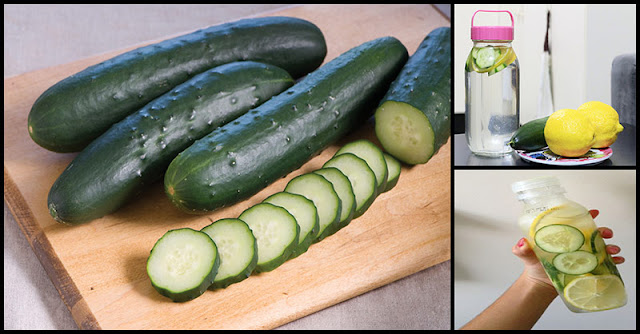High blood pressure can increase your risk of developing kidney problems and heart diseases. In order to reduce health risks, people with high blood pressure should know the essential foods they should consume.
According to researchers, cucumber, which is usually treated as a vegetable, is the one that can help you in alleviating hypertension.
Cucumbers are rich in vitamins, minerals, carbohydrates, and trace metal elements that are important to our metabolism. It has vitamin B1, vitamin B2, vitamin B3, vitamin B5, vitamin B6, vitamin C, folic acid, iron, magnesium, zinc, phosphorus, calcium, and potassium. Furthermore, cucumbers have very a lower calorie value, only 16 kcal per 100 grams and its mass is represented by 95.2% of water.
Benefits of Cucumber for High Blood Pressure
Low Sodium Content
Only 6 mg of sodium can be found in one raw cucumber, thus consumption of it can help in lowering blood pressure. According to the 2010 Dietary Guidelines from the U.S. Department of Health and Human Services, a high-sodium diet can cause high blood pressure or prevent you from lowering it. For those with high blood pressure, no more than 1,500 mg of sodium is recommended per day. Sweet, sour or dill pickled cucumbers can have more than 1,000 mg of sodium per serving.
High In Potassium
One large cucumber contains 442 mg of potassium, which is an important mineral for regulating blood pressure.
Weight Management
According to Mayo Clinic, if you are overweight or obese, you may be able to lower your blood pressure by losing excess weight. For you to do this, you need to consume fewer calories than you expend.
Only 45 calories can be found in a cucumber that weighs 301 g, or approximately 11 oz. More than 95% of the weight of a cucumber is from water, which is a calorie-free nutrient and a natural appetite suppressant.
Cucumber Helps Control Blood Pressure
Many studies show that cucumber has a compound known as sterols, which can help in decreasing levels of cholesterol.
Additionally, cucumber’s high levels of magnesium, fiber, and potassium work effectively in regulating blood pressure, thereby making cucumber a good treatment for both low blood pressure and high blood pressure.
Cucumber Juice Recipe
Ingredients:
3 medium cucumbers
Lime juice or Lemon (for flavor, if desired)
1 cup Water (if necessary, to improve consistency)
Directions:
Remove the skin of the cucumbers and slice them into manageable sizes. Then, put the cucumbers into a food processor or blender and process for at least 1-2 minutes for even consistency. Pour the blended cucumbers into a sieve or cheesecloth to allow the juice to filter into a jar. Press the cucumber fiber with a spoon to squeeze out as much juice as possible and then discard the cucumber fiber. If necessary, you may add water, and lemon or lime juice, to achieve the desired taste. Place it in the refrigerator, serve it cold and drink.
Disclaimer
The watching, interacting, and participation of any kind with anything on this page does not constitute or initiate a doctor-patient relationship with Dr. Farrah®. None of the statements here have been evaluated by the Food and Drug Administration (FDA). The products of Dr. Farrah® are not intended to diagnose, treat, cure, or prevent any disease. The information being provided should only be considered for education and entertainment purposes only. If you feel that anything you see or hear may be of value to you on this page or on any other medium of any kind associated with, showing, or quoting anything relating to Dr. Farrah® in any way at any time, you are encouraged to and agree to consult with a licensed healthcare professional in your area to discuss it. If you feel that you’re having a healthcare emergency, seek medical attention immediately. The views expressed here are simply either the views and opinions of Dr. Farrah® or others appearing and are protected under the first amendment.
Dr. Farrah® is a highly experienced Licensed Medical Doctor certified in evidence-based clinical nutrition, not some enthusiast, formulator, or medium promoting the wild and unrestrained use of nutrition products for health issues without clinical experience and scientific evidence of therapeutic benefit. Dr. Farrah® has personally and keenly studied everything she recommends, and more importantly, she’s closely observed the reactions and results in a clinical setting countless times over the course of her career involving the treatment of over 150,000 patients.
Dr. Farrah® promotes evidence-based natural approaches to health, which means integrating her individual scientific and clinical expertise with the best available external clinical evidence from systematic research. By individual clinical expertise, I refer to the proficiency and judgment that individual clinicians acquire through clinical experience and clinical practice.
Dr. Farrah® does not make any representation or warranties with respect to the accuracy, applicability, fitness, or completeness of any multimedia content provided. Dr. Farrah® does not warrant the performance, effectiveness, or applicability of any sites listed, linked, or referenced to, in, or by any multimedia content.
To be clear, the multimedia content is not intended to be a substitute for professional medical advice, diagnosis, or treatment. Always seek the advice of your physician or other qualified health providers with any questions you may have regarding a medical condition. Never disregard professional medical advice or delay in seeking it because of something you have read or seen in any website, video, image, or media of any kind.
Dr. Farrah® hereby disclaims any and all liability to any party for any direct, indirect, implied, punitive, special, incidental, or other consequential damages arising directly or indirectly from any use of the content, which is provided as is, and without warranties.


